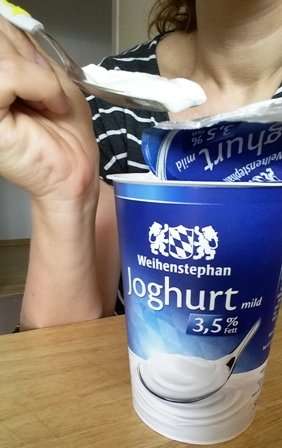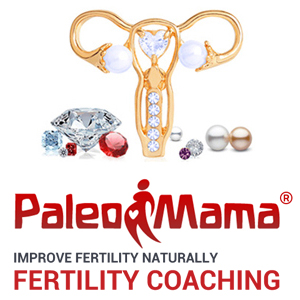Can probiotics increase your fertility? Very likely.
 Today, I would like to only quickly address one issue I wrote about a few years ago, but only now we start to see more articles addressing one important issue: Conception and our gut bacteria.
Today, I would like to only quickly address one issue I wrote about a few years ago, but only now we start to see more articles addressing one important issue: Conception and our gut bacteria.
A quick reminder to start with: Gut bacteria (often called gut microbiome) are not only very important for digestion, they are also many; around 2kg of bacteria we carry around in our gut.
It is estimated that our guts have tens of trillions bacteria, with at least 1000 different types of species, and almost two thirds of our bacterial populations are unique to us.
The big news: good bacteria live also in uterus and ovaries
Remember the times when people thought that womb was some kind of bacteria-free zone and babies first came into contact with microbes while parting with their moms during labor?
Not true. We now know that exposure to microbes in the womb is more common than previously thought and may even be a normal part of human pregnancy.
As the matter of fact, the evidence is emerging to suggest that common body microbes such as lactobacilli may play a beneficial role in body sites traditionally viewed as being sterile?!
While we can only speculate on what functions lactobacilli might perform in the healthy ovary or follicular fluid, other studies suggest a role for lactobacilli already at conception.
Like in cases of failed contact between an egg and a sperm, or other unexplained fertilization failures. As you may remember, of all infertility cases, about one-third remains unexplained (others are attributed to infection or to anatomical and physiological problems).
Is there any serious science behind this? Yes.
Is there a role for gut bacteria in infertility? Very likely.
Some studies investigating unexplained infertility have shown the presence of lactobacilli in human follicular fluid (a tiny bubble in which an ovulating egg grows). These bacteria, known for their beneficial effects on health and their usage in food, have been recently associated with rates of embryo maturation and transfer.
One study I found here that lactobacilli can protect human spermatozoa from radical oxygen species in the presence of vaginal disorders, thereby improving the fertilization potential of the female host.
But how lactobacilli do that? Probably by supplying the right vitamins to the baby. But no one knows for sure yet.
Vitamins are critical for the first 1000 days of life, most notably folic acid for brain and nerve system development. A number of these vitamins (also vitamin K) can be produced by bacteria such as lactobacillus.
Could this be a part of the reason why they are so important in conception? I searched for more information and found this:
A recent study from 2016 (Evidence that the endometrial microbiota has an effect on implantation success or failure) found that in a presence of a non-Lactobacillus-kind of bacteria in uterus was associated with significant decreases in embryo implantation, and live birth rates.
The authors concluded: “Our results demonstrate the existence of an endometrial microbiota that is highly stable during the acquisition of endometrial receptivity. However, pathological modification of its profile is associated with poor reproductive outcomes… This finding adds a novel microbiological dimension to the reproductive process.”
This lovely research paper here (Amino acid metabolism in intestinal bacteria and its potential implications for mammalian reproduction) discusses how changes in the composition and abundance of various bacteria in the gut during pregnancy, as well as their translocation to the uterus, may alter uterine function and modify maternal physiology and metabolism.
The way this research is going, it might soon turn out that mom’s bacteria from uterus and breast milk provides a key for the programming of the whole-body microbiome of her baby.
Wow. That’s so big that I’m wondering whether our children will not be demanding from us mothers in the future to remember every single detail of our nutrition and lifestyle during pregnancy?
In my opinion, women who stay as close as possible to nature in everything that even remotely affects motherhood (conception, pregnancy, birthing) will have the best chances to give satisfactory answers to their kids.
SUMMARY: Which lifestyle factors upset the good bacteria and contribute to the bad ones taking over?
- Antibiotics
- Stress
- Poor diet (with lot of sugar and refined carbohydrates, as well as trans and hydrogenated fats)
- Alcohol
How can you support your digestive health and improve your microbiome?
Consume fermented foods regularly (eat yoghurt, kefir, sauerkraut, fermented cheeses and other foods daily).
Eat foods with lot of fibre, every day. This is so important that I’ll try to write another post about it soon. For now please remember beans and legumes, asparagus, peas, hicory, artichokes, ginger, onions, but also avocado, coconut, pears, and berries![/fusion_alert]
More to read here:
- Eaton SB, Konner M, Shostak M. Stone agers in the fast lane: chronic degenerative diseases in evolutionary perspective. Am J Med. 1988 Apr;84(4):739-49.
- http://www.mayoclinic.com/health/mediterranean-diet/CL00011
- Juhl M, Olsen J, Andersen AM, Grønbaek M. Intake of wine, beer and spirits and waiting time to pregnancy. Hum Reprod. 2003 Sep;18(9):1967-71.
- Sofi F, Abbate R, Gensini GF, Casini A. Accruing evidence on benefits of adherence to the Mediterranean diet on health: an updated systematic review and meta-analysis. Am J Clin Nutr. 2010 Nov;92(5):1189-96.
- Toledo E, Lopez-del Burgo C, Ruiz-Zambrana A, Donazar M, Navarro-Blasco I, Martínez-González MA, de Irala J. Dietary patterns and difficulty conceiving: a nested case-control study. Fertil Steril. 2011 Nov;96(5):1149-53.
- Twigt JM, Bolhuis ME, Steegers EA, Hammiche F, van Inzen WG, Laven JS, Steegers-Theunissen RP. The preconception diet is associated with the chance of ongoing pregnancy in women undergoing IVF/ICSI treatment. Hum Reprod. 2012 Aug;27(8):2526-31.
- Vujkovic M, de Vries JH, Lindemans J, Macklon NS, van der Spek PJ, Steegers EA, Steegers-Theunissen RP. The preconception Mediterranean dietary pattern in couples undergoing in vitro fertilization/intracytoplasmic sperm injection treatment increases the chance of pregnancy. Fertil Steril. 2010 Nov;94(6):2096-101.







